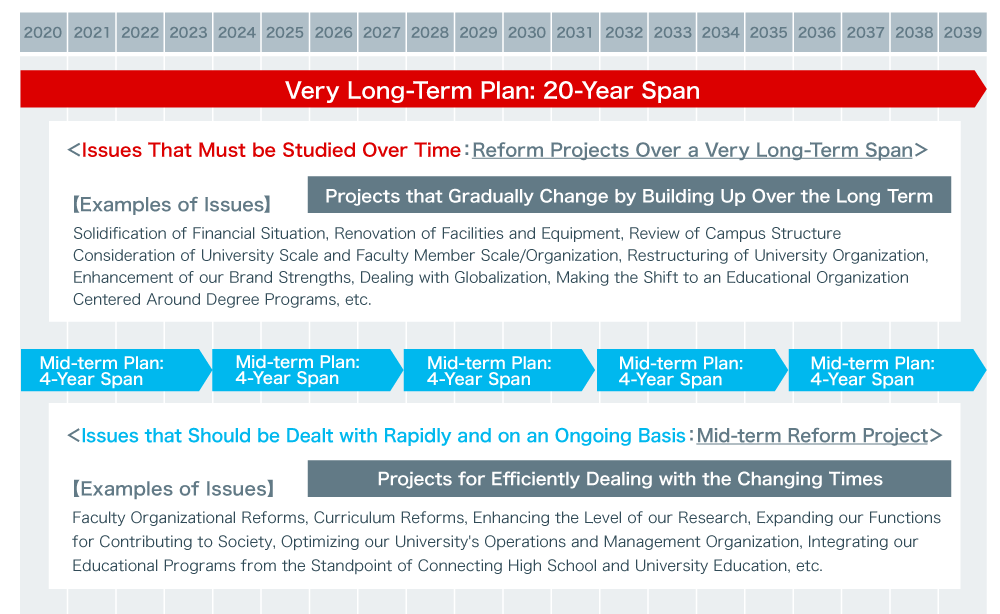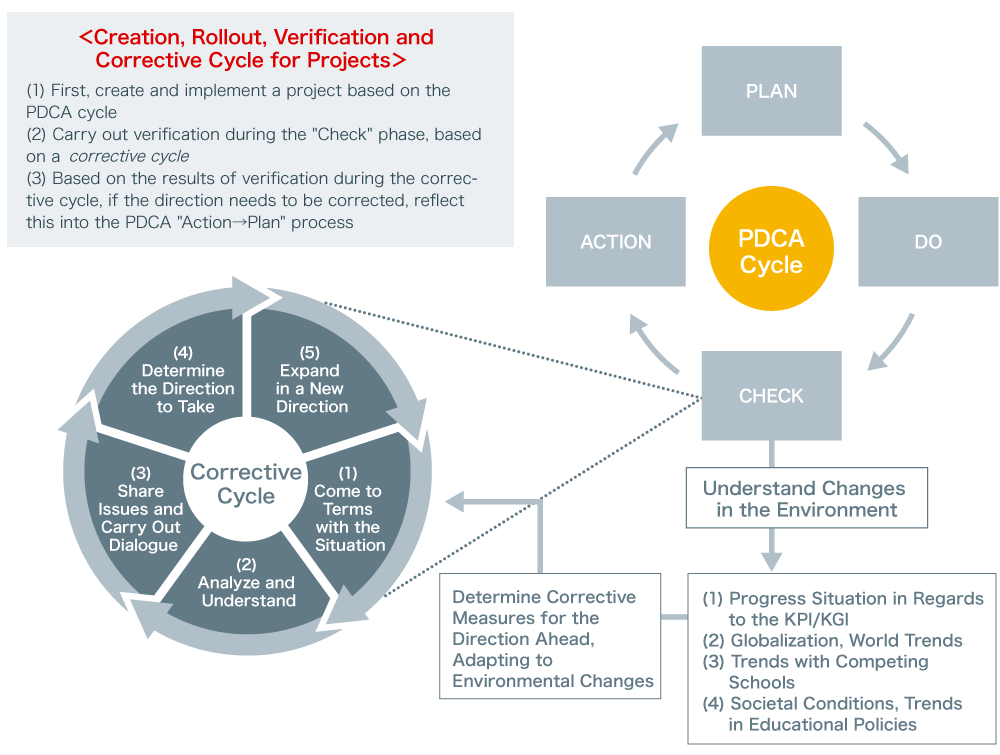Ryukoku University You, Unlimited
Need Help?
Ryukoku Strategic Plan 400
Project Management
1. Planned Timeline and Structure
Considering the uncertainty of the times ahead of us, world trends, changes in circumstances within Japan and so on, our future plan (based on the previous 10-year Long-Term Plan, consisting of methodic planning) will be insufficient to deal with the changes in the times and in society. We are concerned that this may cause disturbances in the operations (business management) of our university. For this reason, with the RSP400 we will make the shift to a "very long-term planning method", with a period that spans 20 years, in order to avoid getting swept up in the tides of change and to create new values as a university. We will set the end of fiscal year 2039—the 400th anniversary of our founding—as the point of achievement for this plan, for the continued and sustainable development of our university.
To flexibly and efficiently deal with demands of society and the changing times, along with the radical changes in our environment, we have summarized the specific measures we will take in our four-year "Mid-Term Plan". This future plan will be structured and carried out as a "very long-term to Mid-Term hybrid method" rolling plan that will build up in five phases.
Rollout Overview of the RSP400

2. Upgrading the Content and Substance of our Assessment Objectives
With our RSP400, we continue from our Long-Term Plan V by setting KPI (Key Performance Indicator) for each project, and KGI (Key Goal Indicator) for our overall indicators.
KGI for the RSP400
By rolling out the RSP400 projects, our university can achieve greater individuality and become a higher education institution that meets world-class standards. In turn, we can contribute to society and to the world, make a contribution towards world peace, and increase the possibilities of our sustainability as a "university that shines brightly."
For this reason, we engage in initiatives to create a university that can support globalization, and we promote internationalization throughout our school in the aspects of educational strength, our level of research, and the structure of our Academic and Administrative Staff and Students, as well as our governance. In doing so, we make the shift towards becoming a world-class organization. Accordingly, as a concrete numerical target that shows the results of these reforms we will be involved in, we want to attain a high ranking as one of the world's prestigious universities.
<KGI Overall Quantitative Numerical Targets for the RSP400>
Attain a Ranking Equivalent to the Top 5% of Universities Listed in "THE Sekai Daigaku Rankingu" (Japan Edition), and Equivalent to the Top 3% of Universities as Listed in the "Times Higher Education World University Rankings" (Global Edition)—Become One of the Ten Best Private Universities in Japan
Note that the evaluative indicators and evaluation standards as part of our quantitative numerical targets will be reviewed according to progress made on our plan, in consideration of various changes in the environment.
【Points to Consider】
- Appearing in the "University Rankings" is not the objective of this goal.
- These rankings are an evaluation of the overall strengths of universities, including foundational elements established by universities such as educational strength, level of research, composition of Faculty Members, ratio of Students, how the university organization is structured and so on.
- Through attaining a top ranking, we will aim to become a world-class university in terms of both quality and brand strength; and we have thus set our KGI as shown above.
- We aim to guarantee and improve the quality of our education and research by using a diversity of external appraisals that we have received, both domestically and overseas.
3. Introduction of PDCA+
(Management System to Flexibly Handle Change)
Environmental changes in the upcoming era will be significant and will occur more and more rapidly. As a result, the projects and initiatives we laid out in our mid- to long-term plan will soon fall out of sync with the times. In our RSP400 that is structured over a long-term span of twenty years, we will complement the PDCA cycle, enhance the effectiveness of our projects and aim to create even more accomplished results. With this aim, we will create a project verification cycle with a restructured "check" phase, introducing a management system (called "PDCA+") that can flexibly handle the changes.
PDCA+ (Management System which Flexibly Handles Change)
